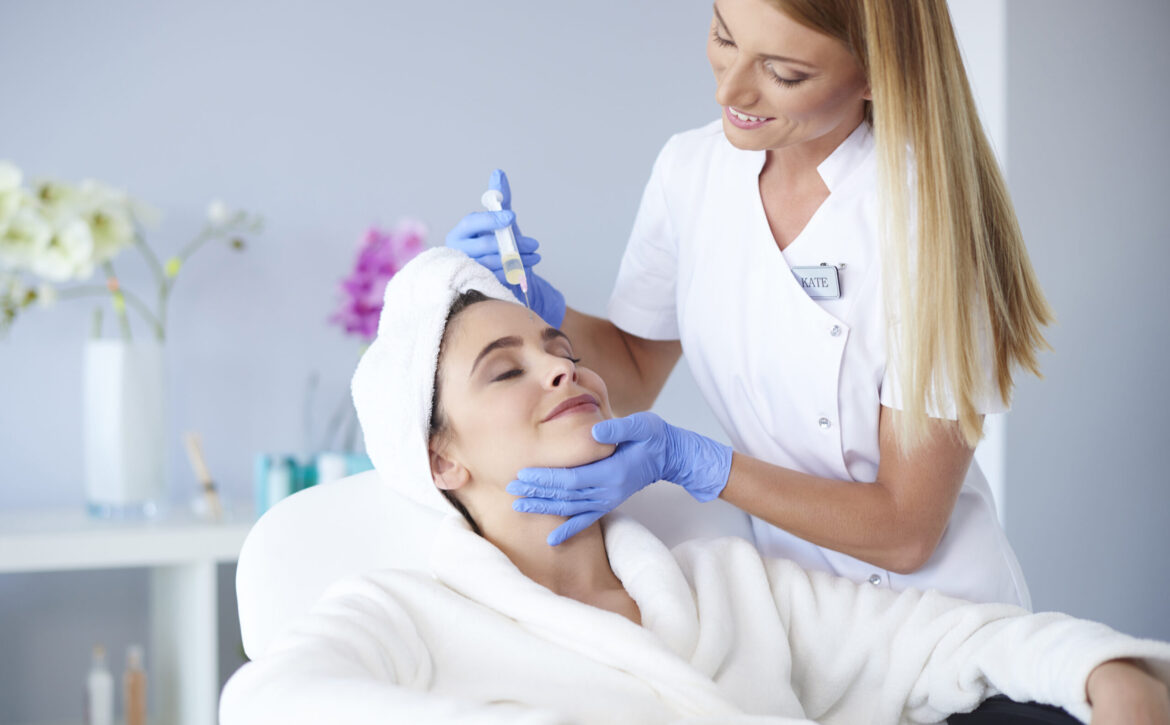
How to Become a Beauty Therapy Expert: Step-by-Step Guide
Becoming a beauty therapist involves learning techniques for enhancing appearance. You need skills in skin care, makeup, and wellness treatments.
Beauty therapy is an exciting career choice for those passionate about helping others feel their best. It combines creativity and expertise, allowing you to make a real difference in people’s lives. Understanding the path to becoming a beauty therapist is essential for success in this field.
This career requires dedication, training, and a keen interest in beauty trends. Many options exist for training, ranging from short courses to advanced diplomas. With the right qualifications, you can work in salons, spas, or even start your own business. Explore the journey to becoming a beauty therapist and discover the rewarding opportunities it offers.

Introduction To Beauty Therapy
Beauty therapy offers a path to transform passion for beauty into a fulfilling career. It blends creativity with care, helping people feel good about themselves. This field is vast, covering everything from skincare techniques to makeup artistry. As a beauty therapist, you embrace holistic beauty practices and stay updated with beauty industry trends. The journey involves massage therapy training, client consultation skills, and possibly a cosmetology certification. Whether you’re drawn to beauty therapy courses or professional development in beauty, you’ll find endless opportunities to grow and excel.
Introduction To Holistic Beauty Practices
Holistic beauty practices focus on the entire person. They go beyond surface-level treatments. This approach considers emotional well-being alongside physical appearance. It involves using natural products and gentle techniques. The goal is to enhance beauty while promoting overall health. By understanding these practices, beauty therapists offer comprehensive care that nurtures both mind and body.
Skincare Techniques
Skincare is a vital part of beauty therapy. Techniques vary from basic cleansing to advanced treatments. Beauty therapists learn how to address different skin types and conditions. This knowledge helps in providing tailored solutions for each client. Regular skincare keeps skin healthy and vibrant. It also prevents common issues like acne and dryness. Mastering these techniques is essential for success.
Beauty Industry Trends
The beauty industry is ever-evolving. Staying updated with trends is crucial. It involves understanding new products, technologies, and methods. This knowledge helps beauty therapists remain competitive. Current trends include sustainable beauty and personalized skincare. Embracing these trends ensures clients receive modern and effective treatments.
Massage Therapy Training
Massage therapy is a relaxing component of beauty therapy. Training includes learning different massage techniques. These techniques reduce stress and improve circulation. They also enhance skin tone and texture. Beauty therapists use massage to complement other treatments. This creates a complete and satisfying experience for clients.
Client Consultation Skills
Consultation is key to meeting client needs. It involves listening carefully and asking the right questions. Good consultation skills build trust. They ensure clients are satisfied with their treatments. Therapists learn to assess skin and recommend suitable products. This personalized approach leads to better outcomes and happy clients.
Makeup Artistry
Makeup artistry is an exciting aspect of beauty therapy. It involves creativity and technical skill. Beauty therapists learn various techniques to enhance features. They master the use of color and texture. This artistry transforms appearances and boosts confidence. Makeup is used for everyday looks and special occasions. Skilled makeup artists are always in demand.
Cosmetology Certification
Cosmetology certification adds credibility. It shows dedication and expertise. Certification involves completing courses and passing exams. It covers all aspects of beauty therapy. This includes skincare, hair styling, and makeup. Certified beauty therapists are recognized for their skills. This recognition opens doors to more opportunities.
Beauty Therapy Courses
Courses provide essential training for aspiring beauty therapists. They cover various topics and techniques. Courses offer both theory and practical experience. This helps students gain confidence and competence. Beauty therapy courses are available at many levels. From beginner to advanced, there’s a course for everyone.
Professional Development In Beauty
Continuous development is important in this field. It involves learning new skills and updating knowledge. Professional development includes workshops and seminars. It also involves networking with other professionals. Staying informed ensures therapists offer the best services. It leads to career growth and satisfaction.

Skills Required
Embarking on a journey to become a beauty therapist requires a blend of various skills. These skills are crucial for providing exceptional services and ensuring client satisfaction. From mastering skincare techniques to enhancing personal grooming skills, a beauty therapist must be proficient in both interpersonal and technical areas. Understanding what skills are essential can help you thrive in the beauty industry. Below, we delve into the key skills required for a successful career in beauty therapy.
Interpersonal Skills
Interpersonal skills are vital for a beauty therapist. They ensure a positive experience for clients, which can lead to repeat business and referrals. A few essential interpersonal skills include:
- Client Communication: Effective communication helps in understanding client needs and preferences. It builds trust and rapport.
- Customer Service in Beauty: Providing a warm and welcoming environment makes clients feel valued and comfortable.
- Empathy: Understanding client emotions and concerns is key. It aids in delivering personalized services.
- Listening Skills: Active listening helps in accurately interpreting client desires and feedback.
Let’s look at a table summarizing the importance of these interpersonal skills:
| Skill | Importance |
|---|---|
| Client Communication | Builds trust and enhances client satisfaction |
| Customer Service in Beauty | Creates a welcoming atmosphere |
| Empathy | Helps in offering tailored services |
| Listening Skills | Ensures accurate service delivery |
Technical Skills
Technical skills are the backbone of a beauty therapist’s career. Mastery of these skills ensures you can deliver a range of services effectively. Key technical skills include:
- Skincare Techniques: Knowledge of different skin types and treatments is crucial. It allows for effective skincare advice and solutions.
- Personal Grooming Skills: Expertise in grooming services such as hair removal and nail care is essential.
- Aesthetic Treatments: Skills in treatments like facials and body wraps enhance client offerings.
- Massage Therapy: Proficiency in massage techniques provides relaxation and therapeutic benefits.
Beauty therapy training and cosmetology certification often cover these technical areas. Continuous learning and practice are important to stay updated with industry trends and techniques. In summary, a blend of interpersonal and technical skills is essential for success in beauty therapy. Understanding and honing these skills will prepare you for a rewarding career in the beauty industry.
Educational Pathways
Embarking on a journey in beauty therapy is an exciting path filled with creativity and potential. The beauty industry offers various educational pathways to equip you with the skills needed to excel. From certification programs to degree options, there are numerous ways to gain expertise and build a rewarding career.
Certification Programs
Certification programs are a popular choice for those seeking quick entry into the beauty industry. These programs are usually shorter and focus on specific skills. You’ll find a variety of options, such as:
- Makeup Artistry Program: Focuses on enhancing your makeup skills and creativity.
- Esthetician Training: Covers skincare techniques, facials, and treatments.
- Holistic Beauty Therapy: Emphasizes natural and alternative beauty treatments.
- Spa Management Courses: Prepares you for roles in managing beauty and wellness centers.
These programs often lead to Professional Beauty Certifications, which are highly regarded in the industry. Many beauty therapists start their careers with a Skincare Certification or another specialized credential. Certifications are excellent for those wanting to specialize and enter the workforce quickly.
Degree Options
If you’re considering a comprehensive education, degree options can offer a broader understanding of the beauty field. Pursuing a Cosmetology Degree provides in-depth knowledge and skills across various beauty disciplines. Here’s what to expect:
- Duration: Typically ranges from two to four years, depending on the program.
- Curriculum: Includes courses in beauty therapy, hair styling, nail care, and more.
- Career Opportunities: Opens doors to diverse Beauty Industry Careers.
Degree programs often blend theory with practical experience. This approach ensures graduates are well-prepared for the demands of the industry. Enrolling in Beauty Therapy Courses at a college or university can be a valuable step for those aiming for advanced positions.
Gaining Experience
Embarking on a journey to become a beauty therapist involves more than just completing beauty therapy courses. Gaining practical experience is crucial for honing your skincare techniques, makeup artistry, and holistic beauty treatments. This real-world experience helps you develop customer service skills and deepen your understanding of beauty therapy certifications. Below, explore two essential paths for gaining experience: internships and volunteering.
Internships
Internships offer invaluable hands-on experience, bridging the gap between theoretical knowledge and practical application. By participating in beauty industry internships, you can work alongside professionals, learning directly from their expertise. Here’s how internships can benefit you:
- Exposure to Diverse Treatments: Internships allow you to observe and practice various skincare techniques and holistic beauty treatments.
- Building Customer Service Skills: Interacting with clients during internships helps refine your communication and service skills.
- Understanding Workplace Dynamics: You gain insights into the day-to-day operations of beauty therapy practices.
Consider this table showcasing typical tasks during an internship:
| Task | Skill Developed |
|---|---|
| Assisting with client consultations | Customer Service Skills |
| Preparing treatment areas | Organizational Skills |
| Performing basic skincare routines | Skincare Techniques |
Beauty therapy training through internships is a stepping stone to achieving essential beauty therapist qualifications. This structured environment builds a solid foundation for your future career.
Volunteering
Volunteering is another excellent way to gain experience in beauty therapy. This approach allows you to apply your skills in real-world settings while contributing to community well-being. Here’s why volunteering is beneficial:
- Flexibility and Variety: Volunteer opportunities often offer diverse experiences, from makeup artistry to skincare techniques.
- Networking Opportunities: Volunteering connects you with industry professionals, enhancing your professional network.
- Building Confidence: Regular practice in a supportive environment boosts your confidence and expertise.
Consider these options for volunteering:
- Participate in community events offering free beauty treatments.
- Volunteer at local salons or spas.
- Engage in charity events focused on beauty and wellness.
Volunteering not only sharpens your beauty therapy skills but also enriches your personal growth. By volunteering, you contribute positively to society, gaining valuable insights that complement your beauty therapy certifications.
Building A Portfolio
Building a portfolio is a crucial step in becoming a successful beauty therapist. It serves as a visual resume that showcases your skills and expertise. A well-crafted portfolio can open doors to new opportunities and clients. It reflects your dedication to beauty therapy and highlights your unique style and capabilities. Whether you’re skilled in professional makeup application or holistic beauty treatments, a portfolio helps potential clients see your work firsthand. It’s also a platform to demonstrate your knowledge from beauty therapy courses and aesthetics training. Let’s explore how to build a compelling portfolio.
Showcasing Work
Showcasing your work is essential for attracting clients. A portfolio should include a diverse range of beauty therapy services. This can be achieved by documenting various skills like skincare techniques, spa management skills, and professional makeup application. Ensure your portfolio displays:
- Before and After Photos: Capture transformations to highlight your expertise in beauty therapy.
- Different Styles: Include a variety of looks to show versatility.
- Detailed Descriptions: Write brief descriptions of the techniques used. Mention any beauty therapy certification or aesthetics training applied.
Organize your work in a way that’s easy to navigate. Consider using a table format to categorize your skills:
| Service | Description |
|---|---|
| Skincare Techniques | Customized facials using latest beauty industry trends. |
| Makeup Application | Professional makeup for events and everyday wear. |
| Holistic Treatments | Relaxing therapies focusing on well-being. |
Highlighting these areas builds trust with potential clients, showcasing your skills and dedication to customer satisfaction in beauty.
Client Testimonials
Client testimonials are powerful tools in a beauty therapy portfolio. They provide social proof and build trust. Positive feedback from satisfied clients can influence potential customers. Here are some tips for incorporating testimonials:
- Collect Feedback: After each session, ask clients for feedback. Focus on customer satisfaction in beauty and client relationship management.
- Highlight Key Points: Choose testimonials that emphasize specific skills. For example, your expertise in spa management skills or skincare techniques.
- Use Real Quotes: Authenticity matters. Use real quotes to maintain credibility.
Organize testimonials in a section of your portfolio. A table can be useful:
| Client | Feedback |
|---|---|
| Emily R. | “The skincare treatment was amazing! My skin feels rejuvenated.” |
| John D. | “Professional makeup application exceeded my expectations. Highly recommended!” |
| Sarah L. | “Holistic beauty treatments were a relaxing experience. Will return!” |
Testimonials boost your credibility and attract more clients. They reflect your skills and commitment to excellence in beauty therapy.
Industry Trends
The beauty therapy industry is constantly evolving with new trends and innovations. Staying updated with these beauty industry trends is essential for anyone aspiring to excel in this field. Understanding these trends helps in providing top-notch services to clients and keeps you ahead of the competition. With a focus on advanced facial treatments, holistic beauty practices, and sustainable approaches, the industry is witnessing significant changes.
Emerging Treatments
In recent years, there has been a surge in demand for aesthetic treatments that focus on both beauty and wellness. This includes a variety of advanced facial treatments that cater to different skin types and concerns. These treatments often incorporate cutting-edge skincare techniques that promise visible results. Some popular emerging treatments include:
- Microdermabrasion: A non-invasive procedure that exfoliates the skin.
- LED Light Therapy: Uses different wavelengths of light to treat skin issues.
- Hydrafacial: Combines cleansing, exfoliation, extraction, and hydration.
These treatments require beauty therapy certification to ensure safety and effectiveness. Enrolling in beauty therapy courses can equip aspiring beauty therapists with the necessary skills. Client consultation skills also play a crucial role in recommending the right treatment based on individual needs. A table summarizing some emerging treatments:
| Treatment | Benefits |
|---|---|
| Microdermabrasion | Exfoliates and rejuvenates the skin |
| LED Light Therapy | Reduces acne and promotes healing |
| Hydrafacial | Deep cleanses and hydrates the skin |
Sustainability Practices
With the growing awareness of environmental issues, sustainability practices in beauty therapy are gaining importance. Clients are increasingly interested in eco-friendly beauty products that are safe for both their skin and the planet. Here are some sustainable practices beauty therapists can adopt:
- Use of biodegradable and recyclable packaging.
- Incorporating holistic beauty practices that focus on wellness and self-care.
- Choosing brands committed to ethical sourcing and production.
These practices not only reduce the carbon footprint but also attract a clientele committed to sustainability. Beauty therapists should stay informed about the latest sustainable products and techniques. This can be achieved through continuous education and engagement with industry forums. Implementing sustainable practices requires a shift in the traditional approach to beauty therapy. It involves a commitment to ongoing learning and adaptation to new beauty industry trends. Embracing these changes can set a beauty therapist apart in an ever-competitive market.
Networking Opportunities
Networking opportunities are crucial for those pursuing a career in beauty therapy. Establishing connections in the beauty industry can provide access to valuable resources and insights. It can also open doors to new career opportunities in beauty therapy. Building a network helps in gaining knowledge about beauty industry trends and techniques. It fosters a community where you can learn and grow alongside peers and mentors.
Professional Associations
Joining professional beauty associations can significantly boost your career. These associations often host events and workshops that focus on the latest beauty industry trends and skincare techniques. Attending these events helps in learning directly from experts and can enhance your beauty therapy certification. Here are some benefits of joining professional associations:
- Access to exclusive makeup artistry courses and esthetician training.
- Opportunities for client relationship management workshops.
- Discounts on industry events and products.
- Networking events with top industry professionals.
Consider these well-known associations:
| Association | Benefits |
|---|---|
| International Spa Association | Workshops on holistic beauty practices. |
| National Cosmetology Association | Focus on skincare techniques and trends. |
Social Media Connections
Building social media connections is another effective way to network. Platforms like Instagram and Facebook are popular for social media marketing for beauty. They allow you to showcase your skills and connect with like-minded professionals. Sharing your work can attract potential clients and employers. Here’s how you can make the most of social media:
- Create a professional profile showcasing your beauty skills and certifications.
- Join groups related to beauty therapy certification and courses.
- Engage with content related to career opportunities in beauty therapy.
- Follow influencers and brands in the beauty industry.
Social media platforms offer a global reach. They enable you to stay updated with beauty industry trends. Additionally, they help in forming connections that can lead to collaborations or job offers.

Career Advancement
Embarking on a career in beauty therapy offers a world of opportunities. From enhancing clients’ confidence to exploring the latest trends in wellness and aesthetics, the journey is rewarding. Career advancement in beauty therapy is vital for staying competitive and ensuring long-term success. By honing specific skills and continuously learning, beauty therapists can carve a niche in this vibrant industry.
Specialization
Specialization allows beauty therapists to deepen their expertise in specific areas. This focus not only boosts professional credibility but also attracts a loyal clientele. Consider specializing in one of the following:
- Skincare Techniques: Mastering advanced skincare techniques can lead to better client outcomes.
- Makeup Application Techniques: Expertise in makeup can set you apart in bridal or fashion sectors.
- Holistic Beauty Treatments: Offering treatments that focus on holistic well-being appeals to health-conscious clients.
- Customer Service Skills: Exceptional customer service is crucial. It enhances client satisfaction and retention.
Consider pursuing Beauty Industry Certifications to validate your specialization. These certifications demonstrate your commitment to professional development in beauty.
| Specialization Area | Benefits |
|---|---|
| Skincare Techniques | Improved client skin health |
| Makeup Application Techniques | Greater artistry and creativity |
| Holistic Beauty Treatments | Whole-body wellness |
Continued Education
Continued education is crucial for staying updated with industry trends. Beauty Therapy Courses offer fresh insights and skills. These courses cover a range of topics, from Esthetician Training to advanced Wellness And Aesthetics.
- Enroll in Beauty Therapy Internships to gain hands-on experience.
- Participate in workshops focused on new techniques and technologies.
- Attend seminars conducted by industry leaders for professional growth.
Engaging with continued education enhances your skills and opens doors to new opportunities. It ensures you remain competitive and relevant in a fast-evolving industry. Prioritize ongoing learning and skill refinement. Professional development in beauty is an ongoing journey. Stay curious and eager to learn. The beauty industry is dynamic; adapting and evolving is key to success.
Frequently Asked Questions
How Long Does It Take To Become A Beauty Therapist?
Becoming a beauty therapist typically takes 6 months to 2 years. Duration depends on the course level and institution. Diploma courses are shorter, while degree programs take longer. Practical experience and ongoing training enhance skills and career prospects. Consider course accreditation for better job opportunities in the beauty industry.
What Degree Do You Need To Be A Beauty Therapist?
To become a beauty therapist, you typically need a diploma or certificate in beauty therapy. Some countries may require additional licensing or certification. These programs often cover skincare, makeup, and massage techniques. Ensure the course is accredited to meet industry standards.
How Much Is Beauty School In Texas?
Beauty school tuition in Texas typically ranges from $5,000 to $20,000. Costs vary based on program length and institution. Additional expenses like books and supplies might apply. Research schools to find detailed pricing and scholarship opportunities. Consider factors like location, reputation, and curriculum when choosing a beauty school in Texas.
Is A Beauty Therapist The Same As An Esthetician?
A beauty therapist offers a range of services, including skincare, hair, and nails. An esthetician specializes in skincare treatments, such as facials and waxing. Both roles focus on beauty, but estheticians have a more specific focus on skin health. Training and certification requirements may also differ between the two professions.
Conclusion
Embarking on a career in beauty therapy offers many rewards. You can help others feel confident and beautiful. Start with a solid education in beauty techniques. Practice regularly to improve your skills. Build a portfolio that showcases your best work.
Networking is key, so connect with other professionals. Stay updated with the latest beauty trends. Always prioritize client satisfaction and safety. With dedication, you can succeed in this field. Remember, passion and hard work go hand in hand. Your journey to becoming a beauty therapist starts now.
Embrace it with enthusiasm and determination.





